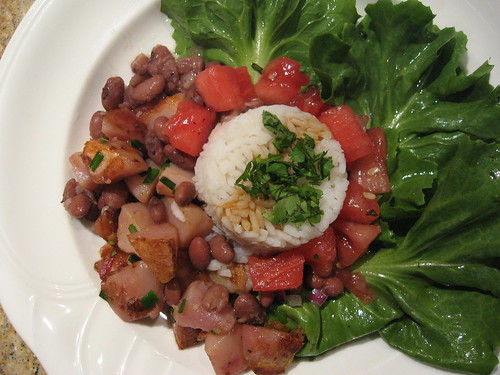What's Your Meal Story?

Isolation. Grab it quick. Skip it. Make it fast. Gulp it down. Pull it from a box. Panic. Too often, these are the familiar words of our meal stories.
Says Margaret Kim Peterson, in her book Keeping House, "In the modern American culture, in which 'busyness' can seem simultaneously like the badge of a good life and like a curse that is impossible to escape, finding time to eat or to feed others can become a challenge. People eat on the run; they feed their children in the car; they skip breakfast, eat lunch at their desks, and panic when it is dinnertime. Magazine headlines in the grocery store checkout aisle ('From Desperation to Dinner in 15 Minutes!') suggest that in too many households, the need of people for an evening meal has become a perpetual emergency." (p.107)
What to do?
This week I was inspired to rethink my own meal stories by Mark Galli's book Beyond Smells and Bells: The Wonder and Power of Christian Liturgy. As you may suspect, Galli's book is not about cooking, not about food preparation, not really about eating at all. And yet.
Galli classifies the divisions of liturgical Sunday services as such: gathering, word, sacrament, dismissal. Gathering, he says, is "more than an efficient way to get things started." It begins with hymns and acclamation, signaling that "we are gathering as one people, not as a collection of individuals." It points to the way God plans to gather us, as prophesied in Isaiah...
On this mountain the LORD of hosts will make for all peoples a feast of rich food, a feast of well-aged wine, of rich food full of marrow, of aged wine well refined.
This is followed by a journey into the Word, where the "biblical story unfolds week by week". Then comes the Sacrament, in which by "sharing this meal, we remember the whole sweep of our story." Finally, the Dismissal "sends us out to participate in the great gathering work."
He concludes, "By participating in the liturgy, we're doing more than 'attending a service.' We are entering a story— a story in which we also play a role. We are the people who have indeed been gathered. We are the people who share in God's very life. We are the people sent forth to proclaim God's story and to invite people into the grand story."
Reading Galli's words, the centrality of both food and community struck me. I was taken back to Peterson's assertion that "The simple act of eating together is perhaps the most fundamental of all the ways in which food can express and foster the community that God desires should exist among people and between humans and God." (p.123)
Even as I cycled back to Peterson, I turned a curve and landed in Galli's court again. I began to think. Perhaps our humble mealtimes are a small opportunity to bring the power of Liturgy home. I began to question. How do I gather my family, what are the words of our mealtime story, what is embodied in our brief time together, how do we leave the table and go out into the world?
I like some of the answers I already have to these questions. We set the table together, we [generally] say grace, I have begun to read poetry to my children after I finish eating and they are still munching, I try to serve good food (if not "rich" like God in Isaiah) to nourish both body and soul, we clear the table together.
But I also see room for changes. Perhaps I could invite my children to prepare dinner with me more frequently. Maybe we could read scripture or the Book of Common Prayer during the meal sometimes. Or we could do what one of my friends does: discuss our favorite and least favorite parts of the day. Would it be out of place to occasionally sing some hymns and take communion? Inviting others just a little more often could also be a worthy goal (particularly because weeknight meals mean we are without "daddy" at the table). Or we could even just make more to give away.
We are not inspired by our culture to make our meal stories thick with love, community, liturgy. But we can rethink, revise our meal stories, aspiring to mirror God himself. As Peterson says, "There is a sense in which...scripture can be seen as an account of God's efforts to get humans back at the table with each other and himself."
Maybe we could begin with the simple act of coming to the table at home. With a story worth living, eating.
Quotes from Galli's book are taken from pp. 14-18. Chinese Potatoes photo, by L.L. Barkat.
Chinese Potatoes
Cut in chunks and saute until tender...
• about 4 potatoes (or more, depending on desired quantity)
Toss in and saute until warmed...
• 1/2 - 1 cup cooked red beans
• small handful of scallions or chives, chopped
• 1 garlic, minced
Pour on...
• soy or tamari sauce to taste
• about 1 tsp regular dark or spicy sesame oil
Serve on bed of lettuce, topped with chopped tomatoes and "castle" of rice garnished with soy sauce, regular sesame oil and chopped cilantro.
Labels: Beyond Smells and Bells, community, Keeping House, life management, Margaret Kim Peterson, Mark Galli, story










17 Comments:
What a great recipe! I think I'll try it next week. And I keep forgetting about all the recipes you have on your sidebar... I need to spend some more time perusing it!
Jaime
These are such neat connections you're making, L.L. They resonate with me because I grew up in a family that ate supper together nearly every night. No ball practices, no TV on in the next room, no one allowed to come and go as they pleased... in a sense, mealtime around our table was a sacred time of fellowship that strengthened the bonds that made us a family.
It wasn't so much about what was served, as it was about all of us being together to look one another in the eye, to talk about our day, to make each other spew milk out our noses with laughter, to learn proper etiquette (and receive discipline when our elbows were on the table). Guess what? Dinner time and family bonds have become of the utmost importance to me now, and I know it has everything to do with the emphasis my parents placed on honoring our "together time" when I was a kid.
I also have always found it funny that 99.9% of church fellowships incorporate food. We joke about it all the time, but I have never been able to put my finger on why it is that food and fellowship are like hand-in-glove. But you're hitting on it right here. We share in the feast and fellowship as a family in Christ draws around the dinner table.
I have enjoyed all the quotes you've shared from Peterson's book. I'll have to see if the library has a copy so it can go on my extendo-bed right next to the edible plant books. ;)
Jaime... it's simple. The way I like food in the summer.
Erin... I hadn't even considered that some people have the TV during meals. Well, I guess I can be happy that's not part of my current "liturgy". :) And that's a good observation about the food always being part of church gatherings; we have a Chinese church that meets in our building on Sunday evenings and they actually do a potluck after their service EVERY single week. Why do You suppose food is such a natural part of fellowship? (Maybe besides this being related to our status as "a family in Christ"?
Why food and fellowship?
At first, it would seem that "Well, you gotta eat sometime, we might as well do it together" would suffice. But I think it surely has to go deeper than that.
Peterson says, "The simple act of eating together is perhaps the most fundamental of all the ways in which food can express and foster the community that God desires should exist among people and between humans and God."
Who do you invite to sit at the fest table in your home? Usually friends, family, honored guests. When we share meals together as the Body, we subtly claim that Christ has made bonds of peace between each of us, that we are siblings gathered around the Father's table, and that we are sought-after guests at the bridal feast.
Perhaps we always go to food because it is a sensory reminder of the goodness of the Lord. Like listening to worship music, like watching a bubbling brook, like feeling the sun on our faces... we are drawn to share in Biblical community through our senses.
Perhaps it's just because I like food?
Oh, Erin, you are too much! I was rapt by your philosophy of the importance of food, then I turned the corner and... smack... head into hilarity. Yes, I admit I like food an awful lot too. (This means that if we ever meet, we know what the centerpiece will be. :)
L.L.,
I like the connection you make between dinner time and liturgy. I find myself longing for a more formal liturgy on Sunday mornings (as opposed to the very free-form style of church we currently attend). Your post reminded me of something I read in the context of house church: "The Lord's Supper started out as a substantial meal with symbolic meaning; we've turned it into a symbolic meal with substantial meaning." There's a big part of me that believes that the family dinner table is one of the best places to practice communion (in all senses of the word).
Maria, that is a marvelous quote. Do you remember where you read it? Somehow (I cannot explain my brain, sorry!) I suddenly had this thought that "house" has become a symbolic place with substantial meaning rather than the other way around too. Or, in other words, we fancy our homes to be places of security, comfort, nurture, rootedness, but in actual practice they are rather empty of the things that should make it so...
a real dinner table with real food to come to, voices to tell stories/histories, hands to play, arms to embrace, a clean space in which to dream and rest. You know? Kind of some of the things Peterson is getting at in her book.
Question about one of the books mentioned in your sidebar... I was thinking of checking out "Radical Simplicity." What's your take on the book? It sounds interesting (I looked it up on Amazon).
That book changed my life and became the impetus for a commitment that then became the basis for my next book (what a mouthful this sentence is!).
This said, I think you could get what you need from it by taking it out at the library. It's not the kind of book one really needs to own, since some of it breaks down and becomes more like his notebooks than a coherent narrative.
Still, I recommend it. Does that help?
Well, just so you know, I was completely serious on all of those points.
It is possible to be completely serious and tongue-in-cheek at the same time, isn't it? At least when referring to one's love of food and the desire to spiritualize it?
... isn't it?
Being single.... I think one of the things I miss the most is the fellowship of a shared meal. This summer I am basking in the companionship around the table, over delicious, home-created, garden-grown food.
Erin.... with you, I believe anything is possible. :)
Joelle... the interesting thing about the book Keeping House is that she doesn't slant it just towards married-with-children people. Which is partly what I found so refreshing about her work. Her chapters on food, then, might be of interest to you. But I hear what you're saying about it not feeling the same as being with family. In a way, I've had to find new "liturgies" since my spouse is no longer home with us for dinner during the week. The absence of certain people changes dynamics, yes? To your mind, what would be a satisfying "liturgy" as a single person?
certainly food in the car on the long commute between work and home or church - our two primary destinations in the evening - does not build community, even between mother and daughter.
Cracking up.
L.L., for starters, my liturgy, practicing presence, could include making a whole meal, rather than slopping together leftovers or a sandwich. I need to get out of the habit of standing and multitasking while I eat--making a lunch to take to school, reading a book, washing dishes. I have two single, older lady neighbors who might like to share a meal from time to time. Thanks for getting me thinking....
Gorgeous picture of yummy food.
Okay, okay--I'm off to order that book NOW.
I have to take care of my eating habits. We all work for food and if we cant even give food 30 minutes daily , thats out misery.
Post a Comment
<< Home